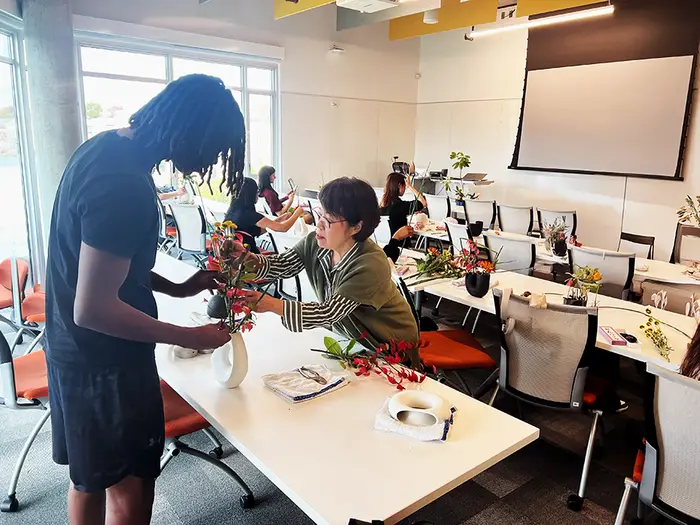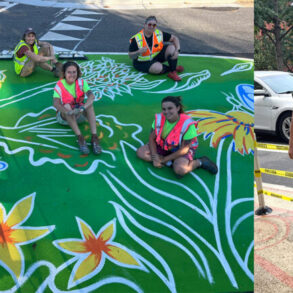The Tepper School of Business(opens in new window)‘ Communication Design for Business course, where students typically learn visual principles like typography, composition and layout to design impactful business materials, recently incorporated the Japanese art of ikebana to encourage creativity, intentionality and cultural awareness.
Ikebana is the Japanese art of arranging natural, seasonal materials to foster harmony and personal expression, encouraging students to explore form, color, and composition.
The course, led by Distinguished Service Professor of Design Ming Ming Chapman(opens in new window), welcomed Reiko Nakajima of the Sogetsu Pittsburgh Study Group(opens in new window) and Brittany Reilly, a local advocate for inclusive networking, to lead a workshop where they introduced ikebana’s principles of form, color and negative space.
After Reilly led a brief presentation about the history of Sogetsu Ikebana, Nakajima provided a live demonstration where she used a vessel and organic cuttings from her own garden. She artfully combined horsetail plants for structure, leafy branches for shape and color, and blossoms for both mass and texture. Nakajima encouraged students to prune and shape each element intentionally, while valuing the negative space as much as the materials themselves.
The workshop highlighted parallels to business communication: clarity, purpose and simplicity. By bringing ikebana into the classroom, the Tepper School emphasized that effective communication, like ikebana, is about thoughtful selection and meaningful expression — skills that extend well beyond traditional business contexts. The experience inspired the students to bring a fresh perspective to their work, blending artistic freedom with strategic thinking.
“By incorporating ikebana into the curriculum, we are introducing students to nondigital forms of communication, fostering both their creative skills and cultural awareness in a hands-on and innovative way,” Chapman noted.
After the demonstration, the students chose materials and created their own ikebana arrangements. They presented their final creations to the class and explained how their choices informed their design.
They learned that it is possible to follow traditions and trends while pushing boundaries to create something unique and contemporary. This encourages them to approach situations with an open mind, an attribute necessary in entrepreneurship and collaboration.
Anyone interested in learning more about this artwork can visit the Sogetsu Pittsburgh’s exhibition at Contemporary Craft, The Beauty of Ephemeral and Eternal(opens in new window). The exhibition runs from Sept. 13, 2024 to Jan. 18, 2025.
This post was originally published on this site be sure to check out more of their content








